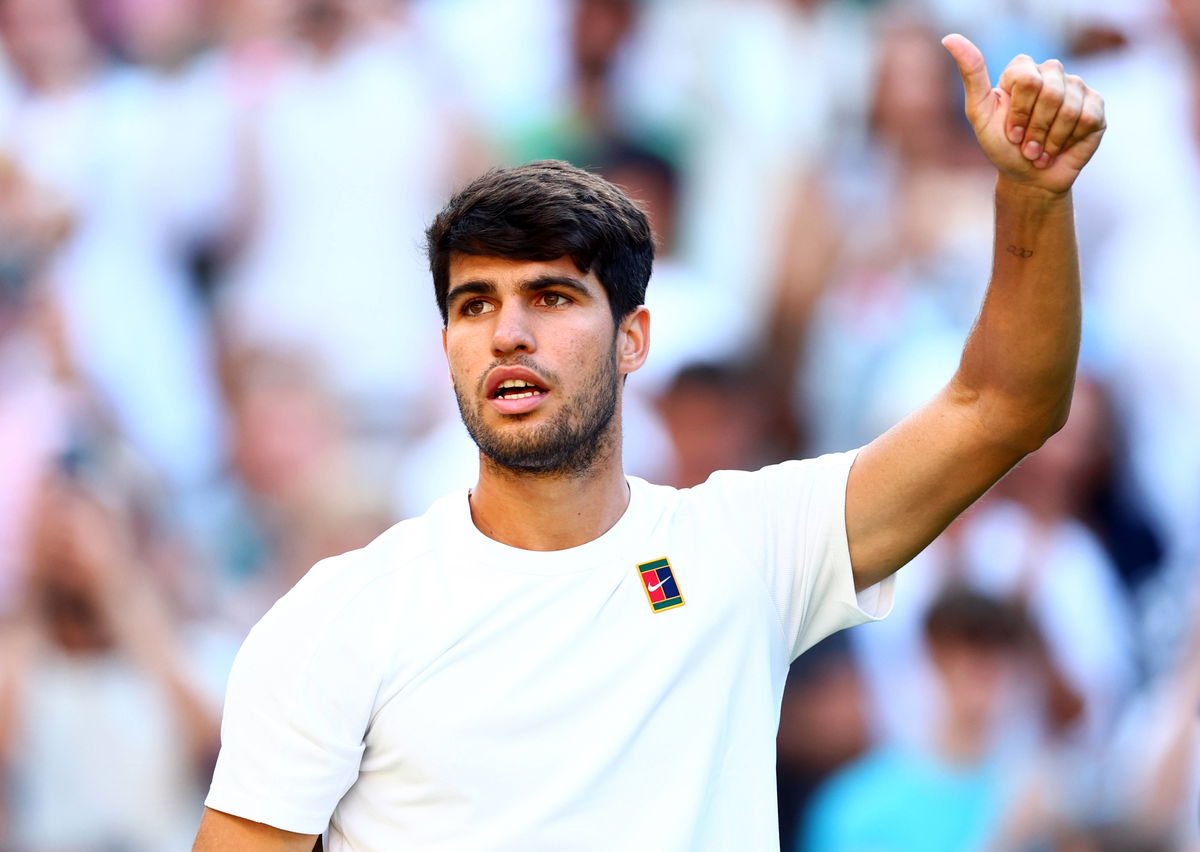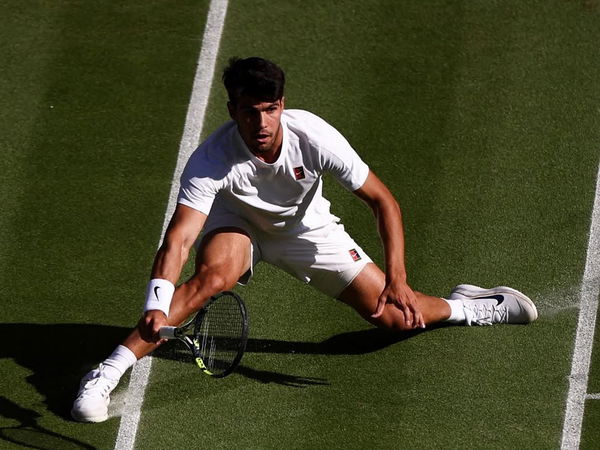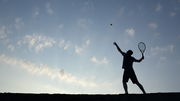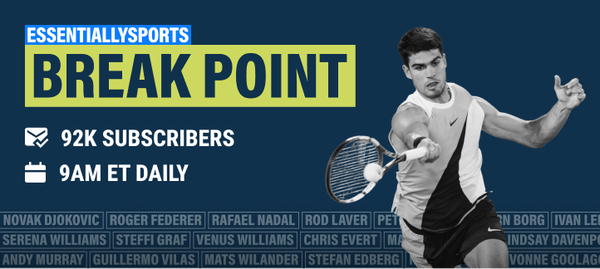
Imago
Carlos Alcaraz celebrates victory in his quarter final match Wimbledon Tennis Championships, Day 9, The All England Lawn Tennis and Croquet Club, London, UK – 08 Jul 2025London The All England Lawn Tennis and United Kingdom PUBLICATIONxINxGERxSUIxAUTxHUNxGRExMLTxCYPxROUxBULxUAExKSAxCHNxDENxINDxITAxPORxESPxSWExTURxMEXxCOLxVENxPERxECUxBRAxARGxCHIxURUxPARxPANxONLY Copyright: xJamesxMarsh/Shutterstockx 15389336hg

Imago
Carlos Alcaraz celebrates victory in his quarter final match Wimbledon Tennis Championships, Day 9, The All England Lawn Tennis and Croquet Club, London, UK – 08 Jul 2025London The All England Lawn Tennis and United Kingdom PUBLICATIONxINxGERxSUIxAUTxHUNxGRExMLTxCYPxROUxBULxUAExKSAxCHNxDENxINDxITAxPORxESPxSWExTURxMEXxCOLxVENxPERxECUxBRAxARGxCHIxURUxPARxPANxONLY Copyright: xJamesxMarsh/Shutterstockx 15389336hg
When discussing the future of men’s tennis, Carlos Alcaraz is at the top of the list. From dramatic Grand Slam triumphs to being the youngest ATP World No. 1 in tennis history, Alcaraz has captured the sport’s spotlight with dazzling shot-play, cool-headed nerve, and off-court work ethic developed from his heritage and upbringing.
Watch What’s Trending Now!
But behind the trophies and rankings, what is Alcaraz off the court? Where is he from, what are his roots, and what are the values that have made him one of the most determined competitors on the tour? Here is the nationality, ethnicity, religion, and schooling of Alcaraz, providing the fan base with an inside look at the upbringing and culture behind the new face of tennis in Spain.
ADVERTISEMENT
Where is Carlos Alcaraz from? What’s his nationality?
Alcaraz is Spanish to the core, having been born on May 5, 2003, in the town of El Palmar, which lies on the outskirts of the city of Murcia in southeastern Spain. There, that sunny Mediterranean locale is blessed with sporting culture, and tennis is the result. He is not a product of any megacity but is from an intimate society with strong values towards the family—and that is how the foundational years of his tennis career were cultivated.
Passion for the sport was natural to him. His father, Carlos Alcaraz González, ran the tennis academy of the Real Sociedad Club de Campo de Murcia, so young Carlos was surrounded by the sport at an early age and was comfortable with the disciplined schedule of a competitive program. This exposure made tennis something more than an extracurricular activity—it was his way of life. By 2018, he was training at the Equelite JC Ferrero Sport Academy in Villena under the direction of former world No. 1 Juan Carlos Ferrero, still his coach today.
From the red dusty clay of El Palmar to the Wimbledon Centre Court, Alcaraz’s sporting personality is innate to being Spanish himself. He carries the flag of Spain with pride everywhere, having won a silver medal for Spain in the Paris 2024 Olympics, showing that home is first, even in the world’s most prestigious overseas competitions.
ADVERTISEMENT
What are Alcaraz’s ethnicity and religion?
Alcaraz is Spanish, with ancestry tied to the culture and traditions of southern Spain. Both parents are classically Spanish: father Carlos Alcaraz González and mother Virginia Garfia Escandón took Carlos and three brothers and educated them in an athletic household with sport, and tennis, most of all, very much the core focus. His grandfather is reported to have been the first in the Alcaraz family to become a member of their local club, and tennis has long had an intergenerational appeal.
ADVERTISEMENT

Imago
Image Credits: Carlos Alcaraz/Instagram
Religion has also been a part of Alcaraz’s childhood and adult life. Alcaraz is Christian. He has openly talked about how religion has a bearing on the way sports and life off the court are approached. He’s credited the effect of the belief in something larger with keeping things in perspective and coping with the intense pressure of the pro circuit in interviews. He does it without pomp but has been known to talk about how faith and the values of the family are the center of the individual and the humility that is known among the public and peers on the circuit.
Top Stories
John McEnroe Breaks Silence on the Potential of Coaching Carlos Alcaraz After Australian Open

Iga Swiatek at the Center of a Possible WTA Shake-Up After 4-Time Slam Winner Speaks Out

Ukrainian Tennis Media Calls Out WTA’s Silence on Player Support

Australian Open Star Who Defeated Jannik Sinner to Win $1M Gets His Tennis’ Biggest Call

Emma Raducanu’s Coaching Turmoil Sparks Sharp Questions From Tennis Legend: “Who’s Making Those Decisions?

The intersection of strong Spanish culture and Christian values has contributed to his grounded personality. Without global fame, sponsorship, or Grand Slam titles, Alcaraz has remained remarkably tied to his origins—indeed, always thinking about home, home-cooked food, and the society back home that first injected the love of tennis into him.
ADVERTISEMENT
Which high school did Alcaraz attend?
While he reached stardom during his teenage years, when most teens are fretting about exams and application forms, Alcaraz juggled schooling with an intimidating schedule of tennis engagements. He attended IES Marqués de los Vélez, an upper secondary school in Murcia, which assisted him in juggling his schooling and training commitments. His academic life was far from normal—indeed, he was already making ripples on the junior tennis circuit and air-traveling to events all over Spain and Europe.
His life was already centered on professional tennis by the time he was an early teenager. When he was about 15, he took the crucial step of moving to Juan Carlos Ferrero’s Equelite Academy in Villena. There, schooling and an intense training schedule continued in conjunction with one another. The school provided an individualized schooling setting structured towards young hopeful athletes, so he did not drop out of school and focus exclusively on tennis full-time.
ADVERTISEMENT
It’s the ubiquitous formula of tough, supple schooling and elite coaching that most of the world’s top players have followed: it paid off immensely in Carlos Alcaraz’s case. By 16, he was already bursting on the ATP Tour at the 2020 Rio Open, and by 19, he was the youngest world No. 1 the ATP has known. Studies were anything but an afterthought, but they were intelligently integrated into the single-minded quest to become a tennis legend.
Carlos Alcaraz is so much more than the tennis phenom with the lethal forehand and Grand Slam wins to his name. He is the product of an intimate Spanish family, raised in the very heart of Murcia, with the clear passion and tradition of the sport passed down from one generation to the next. His Spanish heritage, Christian faith, and strong cultural values have shaped his personality, work ethic, and humility despite being one of the world’s biggest stars in the sport. And although the sport has taken him from the likes of El Palmar to the world’s biggest stadiums, the values that he learned at home remain the motivation behind every step he takes. And it is with that understanding that the fan, or anyone, can learn to know the fierce competitor and gracious young man that is Carlos Alcaraz.
ADVERTISEMENT
ADVERTISEMENT
ADVERTISEMENT
